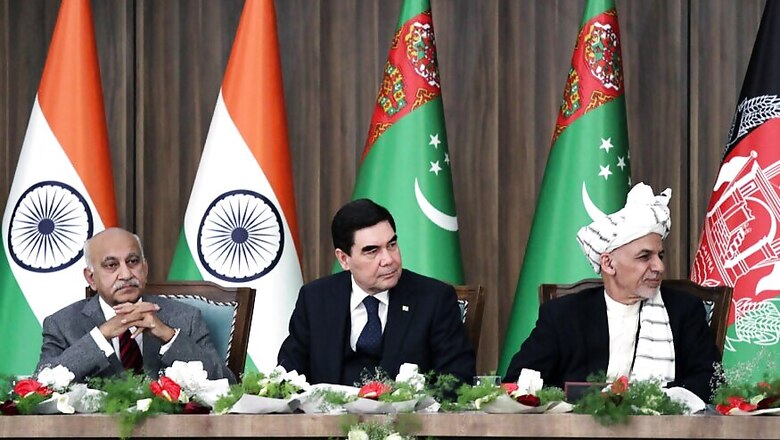
views
Serkhetabat (Turkmenistan): Turkmenistan, Afghanistan, Pakistan and India on Friday ceremonially broke ground on the Afghan section of an ambitious, multi-billion dollar gas pipeline expected to help ease energy deficits in South Asia.
Afghan President Ashraf Ghani and Turkmen counterpart Gurbanguly Berdymukhamedov joined Pakistani premier Shahid Khaqan Abbasi and India's External Affairs Minister M J Akbar for the ceremony at gas-rich Turkmenistan's border with Afghanistan.
Dignitaries including diplomats from the foreign missions in Turkmenistan were greeted by Turkmen national songs and traditional nomadic tents serving up food on an overcast day at the border post of Serkhetabat, once the southernmost tip of the Soviet Union.
Speaking at the ceremony, Ghani said the pipeline would "unite (the) countries" in quotes translated into Russian for reporters at the ceremony.
"There were pessimistic voices, but now we are witnessing the construction of the TAPI gas pipeline," said Ghani, using the acronym for the conduit which takes its name from the four countries.
The quartet aims to complete the 1,840-kilometre (1,143-mile) pipeline and begin pumping natural gas from Turkmenistan's giant Galkynysh gas field by the beginning of 2020.
While the pipeline will traverse war-wracked Afghanistan, raising security concerns, the bulk of the 33 billion cubic metres of gas to be pumped annually through the conduit will be purchased by South Asian rivals Pakistan and India.
Turkmen strongman Berdymukhamedov, whose country currently depends heavily on China as a market for its natural gas exports, called diversification of gas deliveries an "important part of the politics" of the isolated Central Asian country.
And he said work on the Turkmen section of the pipeline was still ongoing.
India's commitment to the pipeline has previously been questioned over its relationship with Pakistan and easy-access to liquified natural gas markets seen as potential stumbling blocks.
But India's minister of state for external affairs M J Akbar hailed the project as "a symbol of our goals" and "a new page in cooperation" between the four countries in a speech at the ceremony on Friday.
The overall funding picture for the mammoth gas pipeline remains unclear, with commercial energy giants such as France's Total failing to follow up on reported interest in the project.
Turkmenistan sits on the world's fourth-largest gas reserves but lost a major buyer in Russia after Russian energy giant Gazprom wound down imports of Turkmen gas and then ceased purchases completely in 2016.
Heavy security will guard the pipeline construction through war-weary Afghanistan, AP quoted Jelani Farhad, spokesman for the Herat provincial governor's office as saying.
"It's a golden day for Afghanistan today," Farhad said. "It will help our economy and create thousands of jobs."
The United States has advocated the pipeline as a source of much needed gas to all three countries over an alternative pipeline, which is also being negotiated, bringing gas from Iran through Pakistan and into India.
Security has been a leading concern leading up to the inauguration but Farhad said Afghanistan has devised a detailed security plan to protect the pipeline construction as well as the pipeline.
Taliban spokesman Zabihullah Mujahid told the AP in a telephone interview that the religious movement was ready to guarantee the pipeline's security. "We are ready to protect TAPI. It is good and important and vital for the economy of Afghanistan," he said, noting the pipeline had been under consideration during the Taliban rule that ended in 2001.
The pipeline will carry gas from Turkmenistan to Pakistan and India through Afghanistan's Herat, Farah, Helmand and Nimroz provinces.
Afghan president Ghani said the next big project being readied is the laying of Afghanistan's first railway tracks, from the Turkmenistan border to Iran. He added he hoped the pipeline would signal the start of better regional cooperation.
















Comments
0 comment